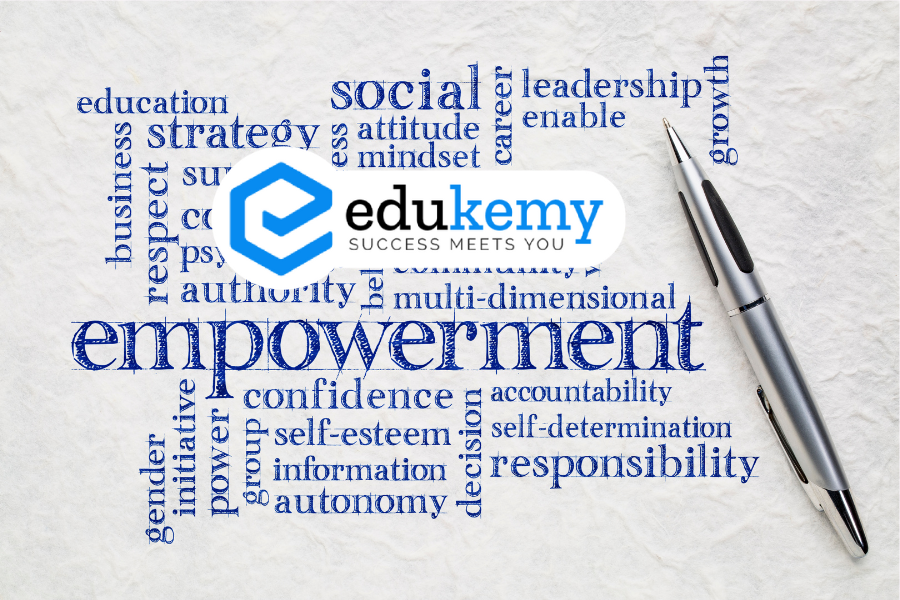
Empowerment is a set of measures designed to increase the degree of autonomy and self-determination in people and in communities in order to enable them to represent their interests in a responsible and self-determined way.
Contents
What is Social Empowerment?
- Social empowerment means all sections of the society having equal control over their lives and the opportunity to take important decisions. A nation can never have a good growth trajectory without empowering all sections of society equally.
- It is understood as the process of developing a sense of autonomy and self-confidence, and acting individually and collectively to change social relationships and the institutions and discourses that exclude poor people and keep them in poverty.
- Perceptions of being empowered vary across time, culture, and domains of a person’s life:
- A low-caste person feels empowered when he/she is given a fair hearing in a public meeting, which is comprised of men and women from the different social and economic group.
- A woman from a conservative household feels empowered if she’s allowed to go out alone without being escorted by a male from her house.
- A transgender feels empowered when she’s given employment.
The need for Social Empowerment
- Social empowerment leads one to take the right job and hence reduce the incidence of unemployment and under-employment.
- Social empowerment leads to a decrease in social violence engineered against the deprived section of the society. If one is empowered socially, they know the rights they enjoy and the duties they serve.
- Social empowerment is also advantageous in case of corruption as people tend to understand the exploitive class and restrain from giving any bribe which ultimately reduces corruption.
- Social empowerment is one approach to reduce poverty. When people are empowered, they tend to use the knowledge in the right direction and somehow reduce their poverty which is so important for national growth also.
- The main advantage of empowerment is that their will be an overall and inclusive development of the society. The money that people earn does not only help them and or their family, but it also helps develop society.
SOCIALLY DISADVANTAGED GROUPS
- Scheduled Tribes
- WOMENS
- Scheduled Castes
- Minorities
- Rural Population
- Senior Citizens
- Persons with Disabilities
FAQs
Q: What is empowerment?
Empowerment is the process of enabling individuals or groups to gain control over their lives, make informed decisions, and take action to achieve their goals. It involves providing resources, support, and opportunities for people to realize their full potential.
Q: Why is empowerment important?
Empowerment is important because it fosters autonomy, self-determination, and equality. By empowering individuals and communities, we promote social justice, economic development, and overall well-being. Empowered individuals are better equipped to advocate for their rights, participate in decision-making processes, and contribute positively to society.
Q: How can empowerment be achieved?
Empowerment can be achieved through various means, including education, access to resources, skill-building programs, mentorship, and creating inclusive environments. By addressing systemic barriers and promoting equality, we can empower marginalized groups and enable them to overcome challenges and thrive.
Q: What are the benefits of empowerment?
Empowerment yields numerous benefits, such as increased self-confidence, improved decision-making abilities, enhanced problem-solving skills, and greater resilience in the face of adversity. Additionally, empowered individuals are more likely to pursue education, entrepreneurship, and leadership opportunities, leading to personal fulfillment and societal progress.
Q: Who can promote empowerment?
Empowerment is a collective effort that involves individuals, communities, governments, NGOs, businesses, and other stakeholders. Anyone committed to social justice and equality can play a role in promoting empowerment by advocating for policy changes, supporting grassroots initiatives, investing in education and training, and fostering inclusive spaces where diverse voices are heard and valued.
In case you still have your doubts, contact us on 9811333901.
For UPSC Prelims Resources, Click here
For Daily Updates and Study Material:
Join our Telegram Channel – Edukemy for IAS
- 1. Learn through Videos – here
- 2. Be Exam Ready by Practicing Daily MCQs – here
- 3. Daily Newsletter – Get all your Current Affairs Covered – here
- 4. Mains Answer Writing Practice – here

